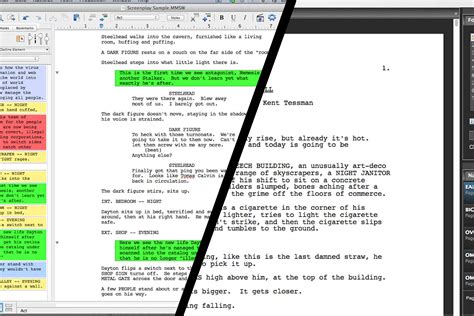Are you an aspiring screenwriter looking to hone your craft and break into the film industry? Look no further than the screenwriting programs offered at American universities. These programs provide a comprehensive and immersive experience that can help you transform your screenplay from just an idea to a full-fledged production. In this blog post, we will explore the various aspects of screenwriting programs in American universities, from the curriculum structure and faculty expertise to the opportunities for workshops, peer feedback, and industry connections. We will also delve into the benefits of access to state-of-the-art facilities and equipment, as well as the networking and collaboration opportunities available in these programs. Whether you’re a novice writer or a seasoned professional looking to expand your skill set, these programs offer a wealth of resources to help you succeed in the competitive world of screenwriting.
Table of Contents
Importance of Screenwriting Programs in American Universities
Screenwriting programs in American universities play a crucial role in shaping the future of the entertainment industry. These programs provide aspiring writers with a formal education in the art of storytelling and screenplay development, equipping them with the skills and knowledge necessary to thrive in a competitive field.
With the demand for original content across various platforms, the importance of screenwriting programs in American universities cannot be overstated. These programs not only foster creativity, but also instill a strong foundation in the principles of storytelling, character development, and dialogue, preparing students for the challenges of the industry.
Furthermore, screenwriting programs in American universities serve as incubators for talent, providing a supportive environment for writers to cultivate their skills under the guidance of experienced faculty members. The mentorship and feedback offered in these programs are invaluable in honing the craft of aspiring screenwriters and helping them develop a unique voice in a highly competitive industry.
Overall, the importance of screenwriting programs in American universities lies in their ability to provide aspiring writers with the necessary tools, knowledge, and support to succeed in an ever-evolving entertainment landscape.
Curriculum Structure of Screenwriting Programs
When considering a program in screenwriting, it is essential to evaluate the curriculum structure to ensure it meets your educational needs and career aspirations. A well-structured curriculum provides a comprehensive understanding of the art and craft of screenwriting, equipping students with the necessary skills to succeed in the industry.
At the core of the curriculum are fundamental courses covering storytelling, character development, dialogue, and structure. These courses lay the foundation for students to build upon as they progress through the program.
Additionally, advanced courses focusing on genre-specific writing, adaptation, and professional portfolio development allow students to refine their skills and explore their unique voice as screenwriters.
Moreover, opportunities to study elective courses in related fields such as film production, directing, and acting can enhance a student’s understanding of the collaborative nature of the industry, providing valuable insights and perspectives on the screenwriting process.
Faculty Expertise in Screenwriting Programs
Faculty expertise plays a crucial role in the success of screenwriting programs. In order to provide quality education and guidance to aspiring screenwriters, it is essential for universities to have a faculty with diverse expertise and experience in the field of screenwriting.
Having faculty members who have worked in the industry as professional screenwriters, directors, or producers brings a real-world perspective to the classroom. Their firsthand knowledge of the challenges and opportunities in the industry can greatly benefit students.
Furthermore, faculty expertise in various genres of screenwriting such as drama, comedy, horror, and science fiction can offer students a well-rounded education. This allows aspiring screenwriters to explore different styles and techniques, enhancing their creativity and versatility.
Lastly, having faculty who are active in the industry and have connections with professionals can open doors for students in terms of internships, job opportunities, and networking. This exposure to the real world of screenwriting is invaluable for students looking to make a career in the field.
Screenwriting Workshops and Peer Feedback
Screenwriting workshops offer a valuable opportunity for aspiring screenwriters to receive feedback from their peers. These workshops are designed to provide a supportive environment where writers can share their work, discuss ideas, and receive constructive criticism. The peer feedback process helps writers hone their craft, improve their storytelling skills, and gain valuable insights into their work.
During these workshops, writers have the chance to present their screenplays or scenes to the group. They can receive input on character development, plot structure, dialogue, and other essential elements of screenwriting. By engaging in discussions with their peers, writers can gain fresh perspectives and identify areas for improvement in their work.
Peer feedback is an essential part of the screenwriting process, as it allows writers to test their ideas and receive honest critiques from fellow writers. This collaborative approach to storytelling can help writers refine their scripts and develop a stronger understanding of what resonates with an audience.
Overall, screenwriting workshops and peer feedback provide a crucial opportunity for writers to grow and learn from one another, ultimately improving the quality of their screenplays and preparing them for the challenges of the industry.
Utilizing Industry Connections for Internships and Job Opportunities
Utilizing industry connections for internships and job opportunities can be an integral part of a screenwriting program’s success in preparing students for the professional world. By establishing strong relationships with industry professionals, universities can provide students with access to valuable resources and potential career pathways.
Industry connections can offer students opportunities to gain real-world experience through internships at production companies, studios, or entertainment agencies. These experiences can be invaluable in helping students apply their classroom learning to practical, hands-on situations, and can also provide valuable networking opportunities for future job prospects.
In addition to internships, industry connections can also lead to job opportunities for graduating students. Faculty members with strong connections to the entertainment industry can often facilitate introductions and provide recommendations for students seeking employment after completing their screenwriting program.
By leveraging industry connections, universities can demonstrate their commitment to providing students with the necessary tools and support to transition into successful careers in screenwriting and related fields. This emphasis on practical experience and industry networking can set a program apart and attract motivated students who are eager to make meaningful connections in the professional world.
Prominent Alumni from Screenwriting Programs
One of the key measures of the success of a screenwriting program is the achievements of its alumni. Prominent alumni from screenwriting programs serve as living testaments to the quality of education and mentorship they received. They are a source of inspiration for current students, showcasing what can be achieved with dedication and hard work. Their success also brings prestige and recognition to the screenwriting program, contributing to its reputation in the industry.
Many notable film and television writers have emerged from screenwriting programs across the country. They have created award-winning scripts, developed popular TV shows, and written blockbuster films that have resonated with audiences worldwide. Their work not only illustrates the impact of a strong screenwriting education but also reinforces the importance of nurturing creativity and storytelling skills within the program.
Additionally, successful alumni often give back to their alma mater by participating in guest lectures, mentorship programs, and industry networking events. Their involvement provides valuable insights and guidance to current students, as well as opens doors to potential internships and job opportunities. This ongoing connection between prominent alumni and the screenwriting program creates a nurturing and supportive environment for aspiring writers, fostering a sense of community and collaboration.
Ultimately, the achievements and contributions of prominent alumni from screenwriting programs serve as a testament to the program’s impact on the entertainment industry and its ability to cultivate talented storytellers. Their continued success reflects the investment and dedication of the faculty, curriculum, and resources provided by the program, reinforcing its relevance and influence in shaping the next generation of screenwriters.
Screenwriting Competitions and Festivals
Screenwriting competitions and festivals play a crucial role in the growth and development of aspiring screenwriters. These events provide a platform for writers to showcase their work, receive feedback, and gain exposure to industry professionals.
Participating in screenwriting competitions not only helps writers refine their skills but also offers the opportunity to win recognition and cash prizes. These competitions often have esteemed judges from the film and television industry, providing invaluable feedback that can help writers improve their craft.
Furthermore, screenwriting festivals bring together writers, directors, producers, and industry experts for networking and collaboration. These events often feature panel discussions, workshops, and seminars on various aspects of screenwriting, offering valuable insights and learning opportunities for participants.
By taking part in screenwriting competitions and festivals, aspiring screenwriters can gain exposure, receive feedback, and establish connections that can open doors to future opportunities in the entertainment industry.
Access to State-of-the-Art Facilities and Equipment
Aspiring screenwriters looking to enroll in a screenwriting program should consider the importance of access to state-of-the-art facilities and equipment. These resources play a crucial role in the development of their skills and knowledge in the art of screenwriting.
State-of-the-art facilities such as film studios, editing suites, and equipment like professional cameras and sound recording devices provide students with hands-on experience, allowing them to gain practical knowledge of the industry standards and practices. This exposure enables them to hone their craft and prepare for real-world scenarios they will encounter in their careers.
Furthermore, access to such facilities and equipment also opens up opportunities for students to collaborate on projects, create professional-quality work, and showcase their talents to potential employers and industry professionals. This access can be a valuable asset in building a strong portfolio and making a lasting impression in the competitive world of screenwriting.
Therefore, when considering a screenwriting program, students should thoroughly evaluate the resources and facilities available to them, as they can greatly impact their learning experience and future prospects in the industry.
Guest Lectures and Industry Professionals in Screenwriting Programs
Guest lectures and industry professionals play a crucial role in the education and training of aspiring screenwriters in university programs. These individuals bring real-world experience and insights to the classroom, giving students the opportunity to learn from professionals currently working in the industry.
By inviting guest speakers from various sectors of the entertainment industry, screenwriting programs provide students with diverse perspectives and valuable networking opportunities. These professionals may include successful screenwriters, directors, producers, and executives who can offer unique insights into the industry and provide guidance on navigating the challenges of a career in screenwriting.
Furthermore, these industry professionals can provide valuable feedback and advice on students’ work, helping them develop their skills and gain a deeper understanding of the craft. This interaction with professionals also allows students to stay updated on current industry trends, market demands, and the evolving landscape of storytelling in film and television.
Overall, the inclusion of guest lectures and industry professionals in screenwriting programs not only enhances the academic experience but also prepares students for the realities of working in the highly competitive and ever-changing entertainment industry.
Networking and Collaboration Opportunities in Screenwriting Programs
Screenwriting programs in American universities offer students a wealth of networking and collaboration opportunities. Through these programs, aspiring screenwriters can connect with industry professionals, fellow students, and alumni, creating a network that can prove invaluable in their future careers.
One of the key benefits of networking in a screenwriting program is the opportunity to collaborate with peers. By working with other students, writers can gain valuable feedback and insights, hone their craft, and form lasting creative partnerships that can extend beyond the program.
Collaboration is not limited to fellow students, as many programs also provide opportunities to work with industry professionals, such as guest lecturers and visiting writers. These collaborations can provide invaluable experience and connections that can help launch a writing career.
Furthermore, networking through screenwriting programs often extends beyond the university setting, with opportunities to attend industry events, film festivals, and workshops. These experiences can further expand a writer’s network and provide exposure to the broader industry.






